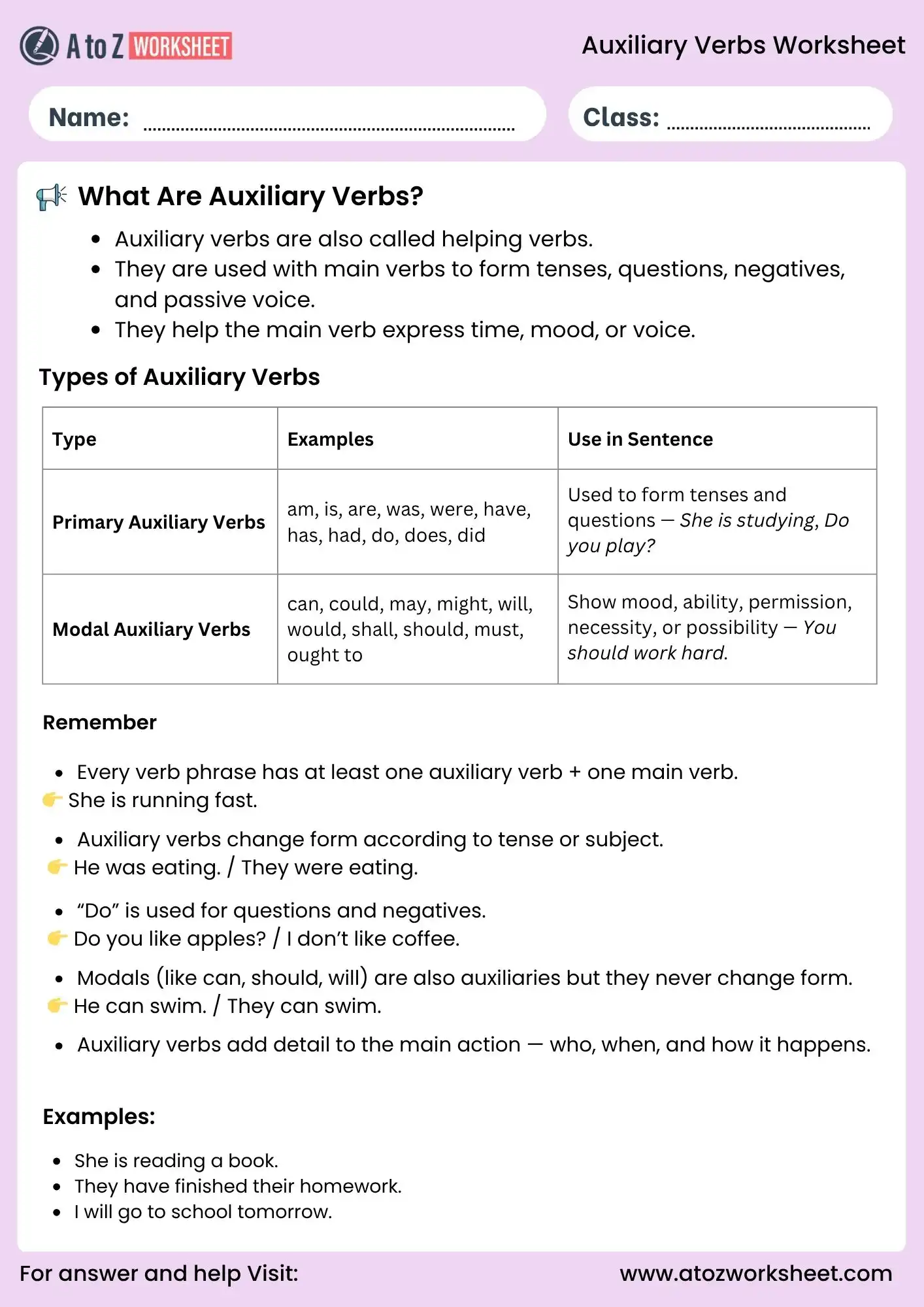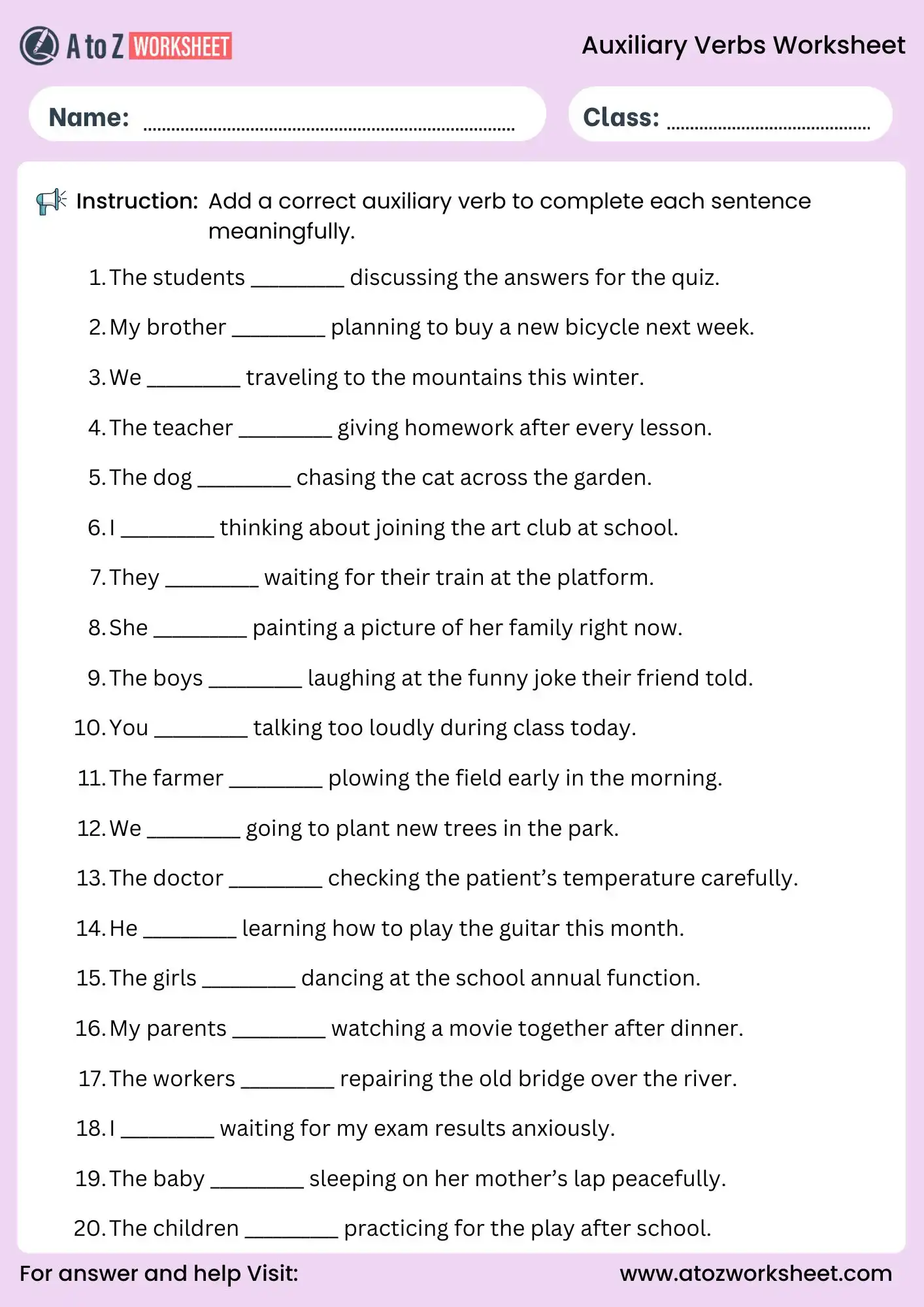Learning auxiliary verbs helps children understand how helping verbs work with main verbs to form sentences correctly. These Auxiliary Verbs Worksheets are designed for Grade 3 to 6 students and include fun exercises like fill-in-the-blanks, choosing the right verb, and rewriting sentences in different tenses. With easy examples and colorful visuals, kids can quickly learn grammar rules while enjoying their practice time.
Parents and teachers can use these worksheets to explain how verbs like is, am, are, was, were, have, has, and will support the main action. Each worksheet is created to build confidence in identifying and using helping verbs in speaking and writing naturally.
Auxiliary Verbs Worksheets For Grade 3 To Grade 6
This collection includes interactive activities where students fill blanks, underline verbs, and identify the correct helping verbs in different situations. The exercises are crafted to reinforce grammar understanding through examples from daily life. These worksheets are ideal for classroom lessons, homework, or home learning sessions for children improving their English basics.







Answers
Parents and teachers can use these answer keys to verify students’ work and provide additional guidance. Each worksheet focuses on identifying and using auxiliary verbs accurately.
Worksheet 1 Answers (What Are Auxiliary Verbs?)
- Examples: She is reading a book.
- They have finished their homework.
- I will go to school tomorrow.
Worksheet 2 Answers (Choose the Correct Auxiliary Verb)
- The boy is playing football in the park.
- The children were studying for their exam together.
- She is baking a chocolate cake for her mother.
- The man was watering the plants in his garden.
- They were waiting for the school bus at the stop.
- I am reading a story before going to sleep.
Worksheet 3 Answers (Underline the Auxiliary Verb and Circle the Main Verb)
- is – explaining
- have – completed
- are – planning
- was – sleeping
- were – playing
- has – built
- am – trying
- had – written
- is – watering
- will – visit
- was – crying
- have been – working
- is – checking
- was – reading
- has been – waiting
- was – moving
- is – looking
- were – laughing
- has – lived
- are – trying
Worksheet 4 Answers (Fill in the Blanks with Correct Auxiliary Verb)
- were
- is
- are
- was
- have
- has been
- is
- must
- had
- were
- are
- am
- has
- were
- are
- are
- was
- have
- am
- does
Worksheet 5 Answers (Tick the Correct Auxiliary Verb)
- (B) are
- (B) is
- (A) have
- (A) was
- (A) have
- (B) am
- (B) will
- (D) was
- (B) have
- (C) have
- (B) were
- (B) was
Worksheet 6 Answers (Add the Correct Auxiliary Verb)
- are
- is
- are
- is
- is
- am
- are
- is
- are
- are
- is
- are
- is
- is
- are
- are
- are
- am
- is
- are
Worksheet 7 Answers (Change the Tense Using Correct Auxiliary Verb)
- She was reading a storybook.
- They will be playing football in the park.
- I was studying for the test.
- The children were helping their teacher.
- He will be cooking dinner.
- We were walking to school together.
- She was singing a beautiful song.
- The cat will be sleeping on the sofa.
- They were cleaning the classroom.
- The baby will be crying loudly.
- He was writing a letter to his friend.
- We will be watching television.
- The students were preparing for the final exam.
Auxiliary Verbs Worksheets PDF Free Download
You can download the complete printable pack that includes all seven worksheets in one PDF. Each sheet focuses on a specific skill — recognizing, choosing, completing, or correcting auxiliary verbs. This resource is great for teachers who want ready-made practice material and for parents looking to guide their children in learning English grammar effectively.
Learning Outcome
After completing these worksheets, students will be able to recognize auxiliary verbs in sentences, understand their role with main verbs, and use them correctly to form different tenses. They will also learn how helping verbs change meaning in sentences and how to apply them while speaking or writing confidently.
Related Worksheets May You Like
FAQs
What are auxiliary verbs in English grammar?
Auxiliary verbs, also called helping verbs, support the main verb to form tenses, questions, or negatives — like is, am, was, and have.
Why are auxiliary verbs important for students to learn?
They help form complete and meaningful sentences, making it easier to express actions in the correct tense or mood.
Are these worksheets suitable for beginners?
Yes, the exercises are simple and child-friendly, ideal for students from Grade 3 to Grade 6.
Do these worksheets include modal auxiliaries?
Yes, they cover both primary (is, am, are, have) and modal verbs (can, should, must, may).
Can I use these worksheets for homeschooling?
Absolutely! They are perfect for homeschooling and classroom use, with clear visuals and complete answer keys.
Summery
These Auxiliary Verbs Worksheets for Grade 3 to Grade 6 help students master helping verbs through clear explanations and engaging practice sheets. Teachers and parents can download the printable PDF and guide children to understand how auxiliary verbs make sentences complete and meaningful.
I hope you like it and to get such worksheets for students on different topics, keep visiting our website atozworksheet.com. For instant updates, follow us on Instagram, Facebook, Pinterest, Telegram and subscribe to our YouTube channel.

